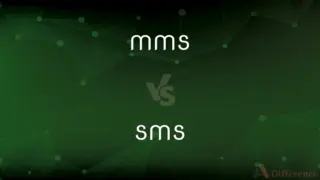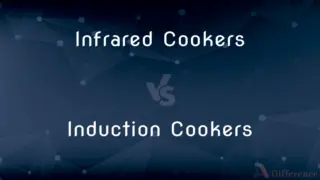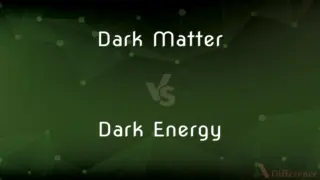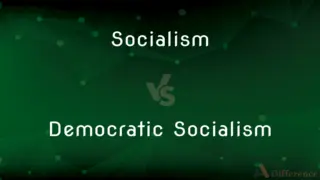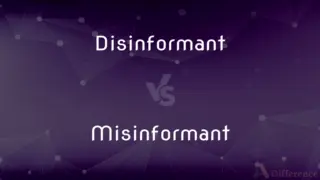Inhibition vs. Restraint — What's the Difference?
Inhibition refers to a feeling that prevents one from acting freely, while Restraint is an act of controlling or limiting oneself or another.

Difference Between Inhibition and Restraint
Table of Contents
ADVERTISEMENT
Key Differences
Inhibition primarily speaks to an internal feeling or psychological barrier that prevents someone from expressing themselves or acting freely. Restraint, on the other hand, can be both an internal self-control mechanism and an external means to control or limit.
While Inhibition is born from fears, anxieties, or societal norms, causing someone to hold back, Restraint often comes from a conscious choice or decision to refrain from certain actions.
Inhibition can be unintentional, rooted in subconscious feelings or traumas, making one hesitant. Restraint is usually a deliberate act, stemming from one's willpower or an external force.
Both Inhibition and Restraint can limit actions or expressions, but while Inhibition might stop someone from dancing freely due to self-consciousness, Restraint might stop someone from reacting angrily in a heated moment.
Essentially, Inhibition is an internal psychological barrier, and Restraint is the act or means to control or limit, either internally or externally.
ADVERTISEMENT
Comparison Chart
Primary Meaning
Psychological barrier
Act or means of control
Origin
Fears, anxieties, or norms
Conscious choice or external force
Nature
Unintentional
Deliberate
Scope
Internal feelings
Both internal and external
Example
Inhibition might stem from past traumas
Restraint is used in controlling aggressive behavior
Compare with Definitions
Inhibition
Inhibition embodies a feeling of self-consciousness that restricts action.
Dance classes helped her overcome her inhibition.
Restraint
Restraint denotes the means to hold back or confine.
The dog was kept under restraint.
Inhibition
Inhibition describes a restraint on natural impulses.
Inhibition kept her from expressing her true feelings.
Restraint
Restraint implies the prevention of action by control.
Restraint was necessary to maintain order.
Inhibition
The act of inhibiting or the state of being inhibited.
Restraint
Restraint is the curbing of one's impulses or actions.
Demonstrators were asked to practice restraint.
Inhibition
Something that restrains, blocks, or suppresses.
Restraint
The act of restraining
Police restraint of the suspect.
Inhibition
(Psychology) Conscious or unconscious restraint of a behavioral process, desire, or impulse.
Restraint
The condition of being restrained, especially the condition of losing one's freedom
A suspect held in restraint.
Inhibition
(Chemistry) The condition in which or the process by which a reaction is inhibited.
Restraint
An influence that inhibits or restrains
"If the enemy could be defined as radically evil, then the restraints of morality did not apply" (James Carroll).
Inhibition
(Biology) The condition in which or the process by which an enzyme, for example, is inhibited.
Restraint
A device or other means of restraining movement
A child restraint in a car.
Inhibition
The act of inhibiting.
Restraint
Control of the expression of one's feelings; constraint
Cursed without restraint.
Inhibition
(psychology) A personal feeling of fear or embarrassment that stops one behaving naturally.
Restraint
(countable) something that restrains, ties, fastens or secures
Make sure all the restraints are tight.
Inhibition
The process of stopping or retarding a reaction.
Restraint
(uncountable) control or caution; reserve
Try to exercise restraint when talking to your boss.
Inhibition
(legal) A writ from a higher court to an inferior judge to stay proceedings.
Restraint
The act or process of restraining, or of holding back or hindering from motion or action, in any manner; hindrance of the will, or of any action, physical or mental.
No man was altogether above the restrains of law, and no man altogether below its protection.
Inhibition
A recusal.
Restraint
The state of being restrained.
Inhibition
The act of inhibiting, or the state of being inhibited; restraint; prohibition; embargo.
Restraint
That which restrains, as a law, a prohibition, or the like; limitation; restriction.
For one restraint, lords of the world besides.
Inhibition
A stopping or checking of an already present action; a restraining of the function of an organ, or an agent, as a digestive fluid or enzyme, etc.; as, the inhibition of the respiratory center by the pneumogastric nerve; the inhibition of reflexes, etc.
Restraint
The of act controlling by restraining someone or something;
The unlawful restraint of trade
Inhibition
A writ from a higher court forbidding an inferior judge from further proceedings in a cause before; esp., a writ issuing from a higher ecclesiastical court to an inferior one, on appeal.
Restraint
Discipline in personal and social activities;
He was a model of polite restraint
She never lost control of herself
Inhibition
The reduction in rate or stopping of a chemical or biochemical reaction, due to interaction with a chemical agent.
Restraint
The state of being physically constrained;
Dogs should be kept under restraint
Inhibition
(psychology) the conscious exclusion of unacceptable thoughts or desires
Restraint
A rule or condition that limits freedom;
Legal restraints
Restraints imposed on imports
Inhibition
The quality of being inhibited
Restraint
Lack of ornamentation;
The room was simply decorated with great restraint
Inhibition
(physiology) the process whereby nerves can retard or prevent the functioning of an organ or part;
The inhibition of the heart by the vagus nerve
Restraint
A device that retards something's motion;
The car did not have proper restraints fitted
Inhibition
The action of prohibiting or inhibiting or forbidding (or an instance thereof);
They were restrained by a prohibition in their charter
A medical inhibition of alcoholic beverages
He ignored his parents' forbiddance
Restraint
Restraint signifies the act of controlling or limiting.
He showed remarkable restraint during the debate.
Inhibition
Inhibition denotes a feeling that restricts free action or expression.
Her inhibition prevented her from singing in public.
Restraint
Restraint describes self-discipline or moderation.
She exercised restraint when offered dessert.
Inhibition
Inhibition refers to a psychological barrier hindering behavior.
His childhood experiences caused an inhibition against confrontations.
Inhibition
Inhibition is the conscious or subconscious restraint of a behavior.
Social inhibitions kept him from speaking out.
Common Curiosities
Can Inhibition always be overcome?
Not always. Some inhibitions are deep-rooted and may require therapy or introspection.
Is Inhibition always negative?
Not necessarily. Some inhibitions can protect individuals from harmful situations.
Does Restraint denote only self-control?
No, while it can denote self-control, it can also mean external control or confinement.
Can Inhibition be societal?
Yes, societal norms and values can lead to inhibitions in individuals.
Is Restraint always beneficial?
No, excessive restraint can be limiting and unhealthy, but appropriate restraint can prevent harm or regret.
Can Restraint be physical?
Yes, restraint can be a physical act or means, like handcuffs or barriers.
Is there a connection between Inhibition and anxiety?
Yes, anxiety can often lead to or amplify feelings of inhibition.
Are there therapies to address deep-rooted Inhibition?
Yes, therapies like CBT can help individuals address and overcome inhibitions.
Is Inhibition always self-imposed?
Often, but external factors like culture or upbringing can also instill inhibition.
Is Restraint always conscious?
While often conscious, it can be an ingrained or learned response over time.
Do only humans experience Inhibition?
While the concept is predominantly human, animals can also show hesitancy due to past traumas or fears.
Can Inhibition and Restraint be used interchangeably?
They have overlapping meanings, but they aren't always interchangeable due to their nuanced differences.
How does Restraint relate to discipline?
Restraint is an aspect of discipline, involving control over one's impulses.
Can Restraint be negative?
If overused or imposed without justification, it can be limiting or oppressive.
Is it possible to have both Inhibition and Restraint in a situation?
Yes, one might feel an inhibition due to anxiety and exercise restraint to avoid confrontation.
Share Your Discovery

Previous Comparison
Trust vs. Fund
Next Comparison
Right Shares vs. Bonus Shares














